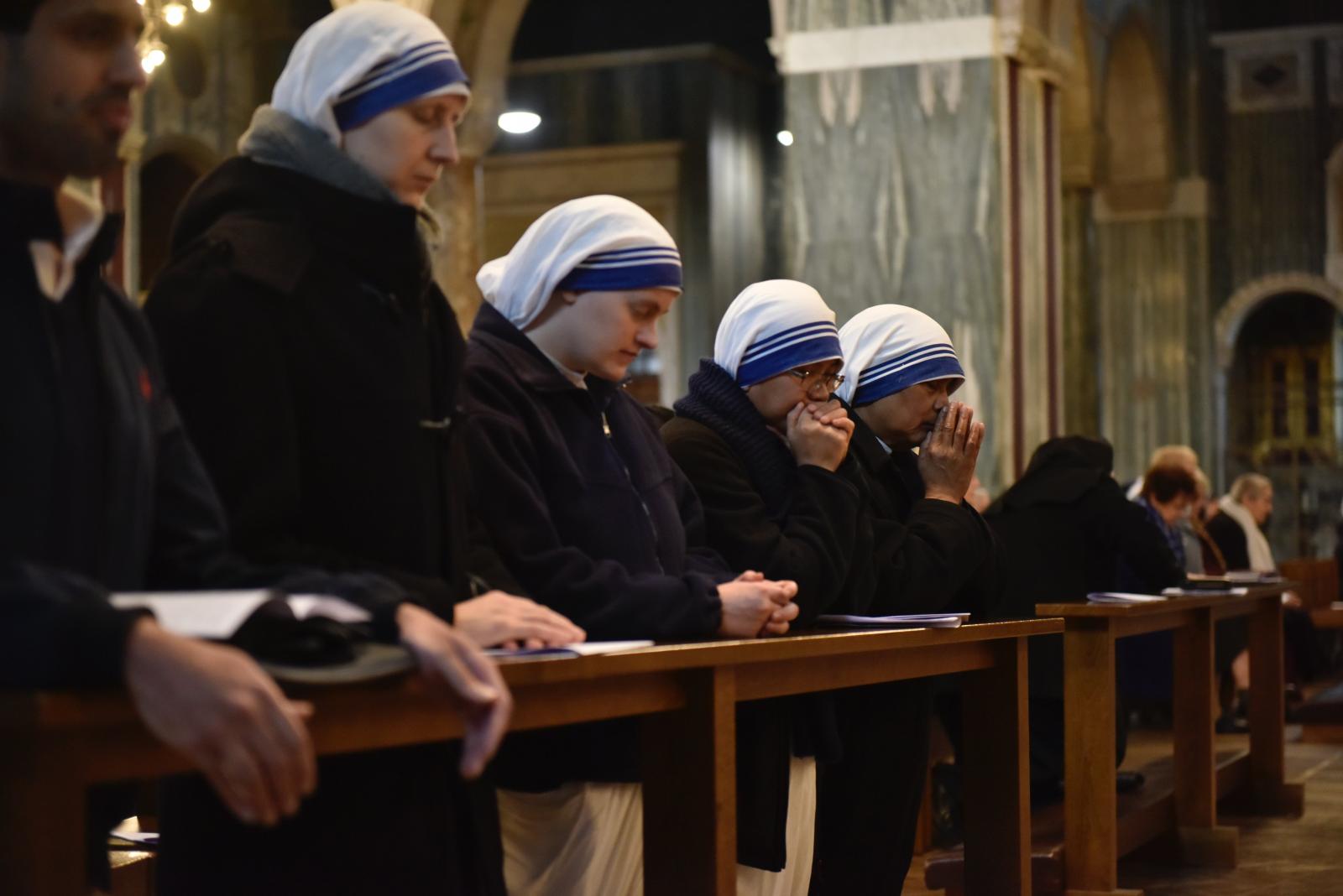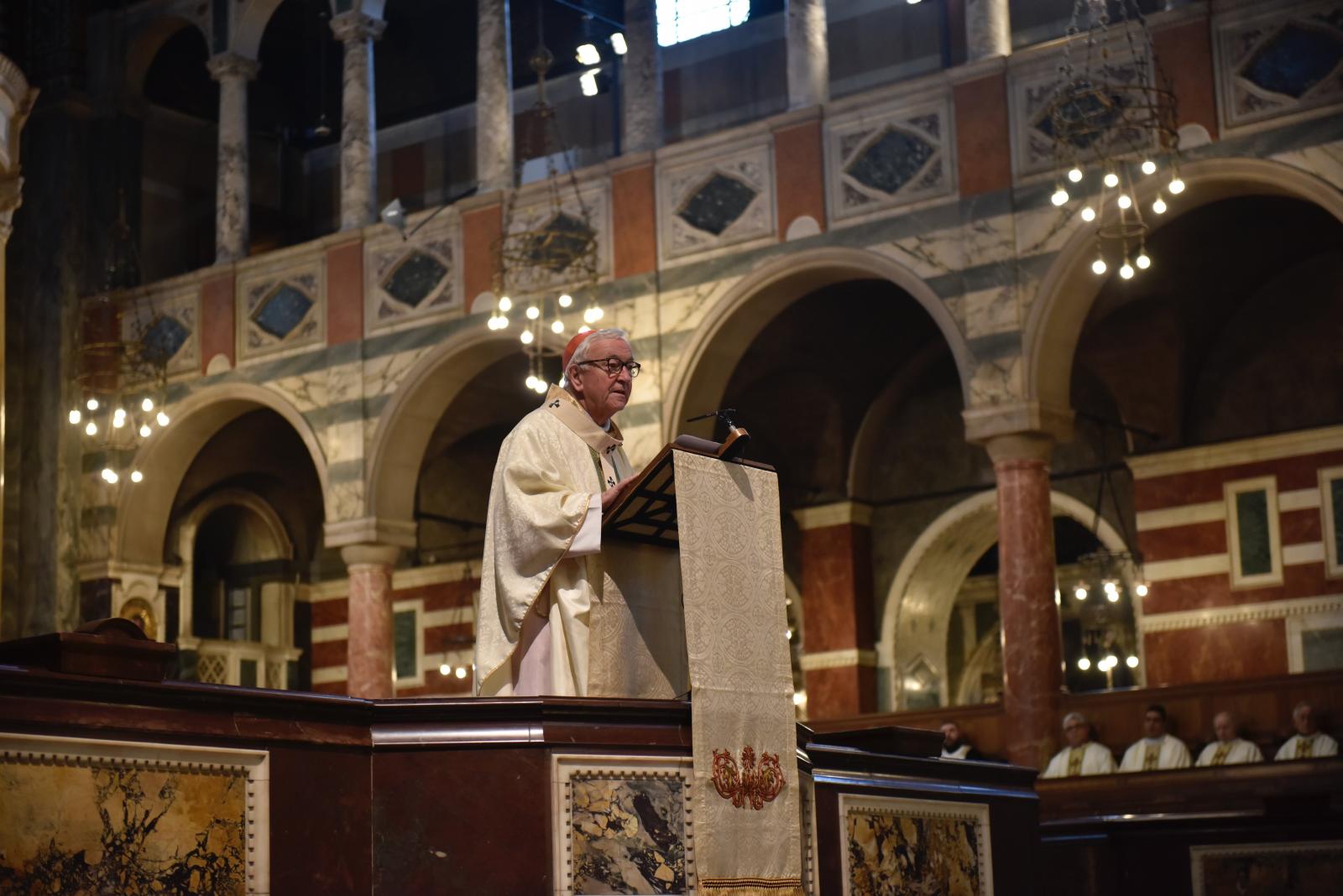Given at the Mass for Religious and Consecrated Persons at Westminster Cathedral on 4th February 2023.
It is real pleasure for me to welcome you all here this morning as we celebrate religious and consecrated life in the Diocese. I have a special word of welcome to those who are celebrating particular anniversaries of profession or ordination:
Platinum Jubliarians
Sr Mary Amicia Eyston
Sr Mary of Mercy O’Brien
65th Anniversary of Profession
Sr Philomena Lyons
Diamond Jubilarians
Sr Mary Catherine Callaghan
Sr Angela Coyne
Sr Margaret Jones
Sr Rita McLoughlin
Sr Francisca Rumsey
Sr Teresa White
Golden Jubilarians
Sr Mary Bridget
Sr Maria Natalia Ferreira Gomes
Sr Catherine Nastala
Sr Bernadette Ryder
Golden Jubilees of Ordination
Fr Natalino Mignoli
Fr Luis Thomas
Now according to my poor calculations, that list adds up to 865 years of dedicated service in the name of our Blessed Lord. Thank God for that!
But more can be seen here today. I think there are some 160 religious here - or maybe more. Now working on a simple average, that means that there are something like 10,000 years of ministry and service gathered here today. Astonishing! And, yes, we give thanks to God for such blessings, such grace, such a generous response to a call to serve!
For many of you today - or at least the Feast of the Presentation of the Lord - was the day of your Profession, the moment of the formal start of your life as a vowed sister or consecrated woman, or man.
Now I don’t know too much about these things, but I do appreciate how radical that moment, that day, really was in your life. A profession involved the receiving of a habit, an outward sign of an intense and lasting sense of belonging to a community; it also involved being given a name, a name for your religious life -
a new name, a new identity, to be fashioned in union with our Blessed Lord. And you may well have been given your first task, appointment, mission - perhaps spoken of as ‘your obedience’. What a moment that was! What a stepping forth, often into a comparative unknown, with only limited realisation of the horizons you would face and the courage you would need.
But it was a lasting, radical step. I well remember a day when I realised how radical this profession actually was. My mother’s sister was always known to me as ‘Auntie Peggy’. But on the day of her funeral the plaque on the coffin said: Sister Thomas More, Professed - such a day, Died, such a day. That was her identity given on the day of her profession. And she had embraced it with great gladness and lived it with unfailing joy!
This day - the Feast of the Presentation - was chosen because it marked the presenting of Jesus as the greatest gift of God: a gift that both embraced all that was old - the requirements of the Law, for example - and that transformed the old into a new saving reality through the completion of his self-giving on the Cross of Calvary. This, I think, is echoed in your own action: embracing a history, a tradition of the Congregation or Order and wanting to live it anew, with renewing vitality and vigour.
 This meaning of the Feast is also to be found in the First Reading, from the Prophet Malachi, in which the one who comes into the Temple is named as ‘the Angel of the Covenant’. What a title, so full of meaning! The Covenant is between God and the People. This Angel, Jesus, is of the very substance of God (as we profess in the Creed - ‘consubstantial with the Father’) and, as we proclaimed in the Prayer of the Mass, was ‘presented in the substance of our flesh’, and, we could add, taken from the substance of Mary’s flesh.
This meaning of the Feast is also to be found in the First Reading, from the Prophet Malachi, in which the one who comes into the Temple is named as ‘the Angel of the Covenant’. What a title, so full of meaning! The Covenant is between God and the People. This Angel, Jesus, is of the very substance of God (as we profess in the Creed - ‘consubstantial with the Father’) and, as we proclaimed in the Prayer of the Mass, was ‘presented in the substance of our flesh’, and, we could add, taken from the substance of Mary’s flesh.
I wonder how often each of you has been thought of, or even called, an Angel. Angels are a bit exotic, they are messages of covenants, of new bonds, formed, lived, sustained through daily ministry, especially with those who might feel totally outside the embrace of any community.
I thank you for this ministry: to youngsters in education whose lives you have transformed; for the many lonely whom you have comforted; for those in extreme circumstances, especially vulnerable women. Stories of your work are so many. Permit to mention one I heard recently, of a woman who was found dead, from suicide, in the grounds of one of our convents. The investigating police simply remarked it often occurs that suicidal women return to die to a place where they have known love and care. And so it was. There she had received simple acts of kindness, and they counted.
There is the lovely well-known phrase: ‘acts of random kindness’ - ARK. Each one of these acts of kindness is, as it were, a small ‘ark of a new covenant’, making visible the embrace always offered by God to every person. And this Ark always needs an Angel.
Just think: most of you will have offered such an act of generous kindness most days. So I do some more adding up. If you take the weekend off from any such kindness, then here, in the Cathedral today we have represented 2,650,000 days of doing good. And if you are good seven days a week, then the total is 3,750,000 days of random kindness! Oh dear! What a great joy this is! Thank God indeed!
One last thought. Today we have been looking back a little, and trying also to appreciate the goodness of each day. But what about the future?
At this point I recall words spoken by Pope Francis, some years ago, at World Youth Day in Krakow. He told the huge crown of young people: if you want to be a sign of hope, then go and talk to your grandparents. Receive from them the memory of a people, a memory of all that has been received. He said, ‘A young person who has no such memory cannot be a sign of hope for the future.’ He said ‘You have to receive the torch of hope from your elders’.
I guess that is what we have done in our lives, standing on the shoulders of those who went before us. So now it is very important that you tell your story, the story of your grandparents and great grandparents in religious life. Tell it in a courageous and forthright manner, letting the goodness of every age, the heroism of every age, be seen for what it is - your, our, pride and joy despite the defects and failures which are woven into its fabric. Find ways of repeatedly telling your story, especially to young people who are longing for inspiration and heroism. Tell it with enthusiasm, imagination, ingenuity and with love!
Millions and millions of acts of random kindness; systematic efforts for human healing and well-being; initiatives that have changed the lives of so many. This is your story. Tell it please with courage and joy. That is what we need: not a dissecting of the past so that nothing remains, but continuity and courage, because ours, yours, is a story of which we can be proud, for it is the story of God’s grace at work in our world.
To that we simply proclaim: ‘Thanks be to God! Amen’
